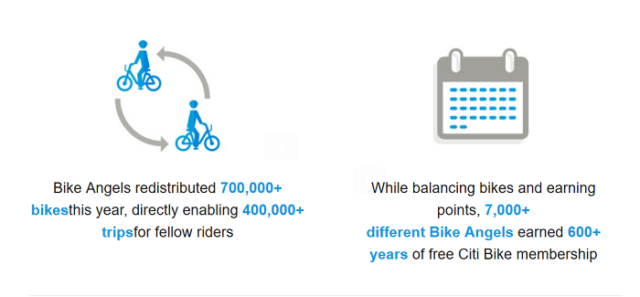Bike Angels program lets Citi Bike members donate rides
by Stefani Cox
June 4, 2018

Source: Citi Bike.
While those in New York City might be quite familiar with the Citi Bike’s Bike Angels program, it’s a concept that deserves attention outside of the Big Apple as well.
Bike Angels are Citi Bike members who have opted to help rebalance the bike share system by taking bikes back to stations where they are needed most, rather than the most convenient station at one’s end destination.
How it works
The concept of the Bike Angels program is simple, and it’s been around since April 2017. Now there are more than 30,000 people registered as Bike Angels.
“Citi Bike’s Bike Angels program rewards members for slightly readjusting their routes,” said Collin Waldoch, Program Manager for Bike Angels. “If enough people adjust, the accumulated impact can make a real difference when it comes to rebalancing the system.”
The result is a system with a feedback loop. Citi Bike benefits by having some of the rebalancing work completed by riders, and Bike Angels benefit by gathering points each time they do so.
“We try to tailor rewards to what the Bike Angels are most interested in,” said Waldoch. “Some people just want to feel like they are advocating for the system; the positive reinforcement is reward enough. However, a handful of riders reached out directly and said they would love to be donating points to low-income New Yorkers.”
Interested parties can forgo using the benefits for themselves in order to help those who might not be able to afford a Citi Bike membership on their own terms.

2017 Bike Angels statistics. Source: Citi Bike.
A self-sustaining mobility option
The Bike Angels program can be a cost-saving mechanism as well.
“People really enjoy the concept of a self-sustaining membership,” said Waldoch. “It’s a true win-win-win in my book, and that’s what people seem to really enjoy the most. It essentially becomes a free membership. That helps us as well, because that’s a member who is likely to become an advocate for Citi Bike.”
Smart use of data
The program didn’t just spring out of nowhere of course. Information-gathering played an important role in being able to launch an effective rebalancing effort. And it’s also critical to understand the goals of program members.
“It helps to have a smart set of algorithms that set the score,” said Waldoch. “Data can predict really well where the flows are coming and going. That took time to perfect. It’s more complicated than looking at just full and empty stations. For example, a residential area at 4pm is probably about to get flooded with bikes. Another important assessment is to really talk to members about the types of rewards they want.”
Bike Angels has just launched in the Bay Area as well, through the Ford GoBike system.
The Better Bike Share Partnership is funded by The JPB Foundation as a collaborative between the City of Philadelphia, the Bicycle Coalition of Greater Philadelphia, the National Association of City Transportation Officials (NACTO) and the PeopleForBikes Foundation to build equitable and replicable bike share systems. Follow us on Facebook, Twitter and Instagram or sign up for our weekly newsletter.
